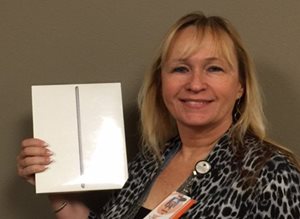Some of our employees “do the right thing” by spreading the word about our culture of ethics to new employees, others do it by scrupulously dotting the i’s and crossing the t’s on contracts or making sure we have great processes to protect patients’ privacy, while some ensure we comply with federal laws governing Medicare in our billing processes.
 We asked our employees to tell us about how they “Do the Right Thing” this year during our annual celebration of National Compliance & Ethics Week. The winners’ stories really make me proud to be part of such an ethical place.
We asked our employees to tell us about how they “Do the Right Thing” this year during our annual celebration of National Compliance & Ethics Week. The winners’ stories really make me proud to be part of such an ethical place.
Compliance in a healthcare network is complicated since we have so many regulations and laws to comply with and so many regulatory agencies watching what we do. It’s important to check in at least once a year to remind each other of the importance of following the rules, doing the right thing and speaking up when you see violations.
Last week, our Ethics & Compliance Department staff were also out in facility cafeterias checking to see what employees know about doing the right thing. Employees spun the Compliance Question Wheel and if they answered a quiz question correctly they won a small gift. We also had 706 employees take the annual online Compliance Week Quiz and all but 60 this year knew that Debra Muscio is our Corporate Chief Compliance Officer (and someone who actually makes following the rules fun!) Those with all correct answers on the quiz were entered into a drawing for a giveaway of several Fitbit personal activity trackers.
Take a look below at this year’s winners of iPads for their “Do the Right Thing” stories and the winners of a Fitbit for really knowing about Ethics & Compliance at Community.
 Sandra Hermans, Organizational Development Consultant, was called a “true Compliance Champion” by her nominator and colleague Carolyn Rose. Carolyn said, “Each week during new hire orientation, Sandra shares how important and valuable Compliance is at CMC. While she includes the legal and punitive aspects which are necessary for any Compliance program, she emphasizes the positive outcomes for our patients and our staff when rules and regulations are followed. Sandra makes sure staff feels empowered to do the right thing by sharing any concerns they have and by making sure they know where and who to go to for support. For Sandra, it is about developing and promoting a culture of compliance with all staff – right from the start.”
Sandra Hermans, Organizational Development Consultant, was called a “true Compliance Champion” by her nominator and colleague Carolyn Rose. Carolyn said, “Each week during new hire orientation, Sandra shares how important and valuable Compliance is at CMC. While she includes the legal and punitive aspects which are necessary for any Compliance program, she emphasizes the positive outcomes for our patients and our staff when rules and regulations are followed. Sandra makes sure staff feels empowered to do the right thing by sharing any concerns they have and by making sure they know where and who to go to for support. For Sandra, it is about developing and promoting a culture of compliance with all staff – right from the start.”
 Marcela Magallon, Community’s 340B program manager, explains, “I work with Gil Ramirez and Abdullah Shaghasi, both pharmacy analysts, to ensure that the complex 340b medications program maximizes savings while ensuring compliance with U.S. Department of Health and Human Services regulations. The program was designed to ‘stretch' scarce federal resources as far as possible, reaching more eligible patients and providing more comprehensive services."
Marcela Magallon, Community’s 340B program manager, explains, “I work with Gil Ramirez and Abdullah Shaghasi, both pharmacy analysts, to ensure that the complex 340b medications program maximizes savings while ensuring compliance with U.S. Department of Health and Human Services regulations. The program was designed to ‘stretch' scarce federal resources as far as possible, reaching more eligible patients and providing more comprehensive services."
“So far, since Jan. 1, 2014, we’ve been able to save more than $16 million. These savings are meant to help fund free and low-cost medications to primary care clinics and hospitals that serve our most vulnerable citizens. With this much in saving opportunities comes a great responsibility to maintain the integrity of the program. We also must adhere to regulations and guidelines in order to maintain our eligibility – mainly ensuring these patients also receive other healthcare services from us.
“As part of my monitoring, I ensure that we meet the Disproportionate Share Hospital requirement, based on how many Medicare inpatient days we provide. Our hospital systems has to have 11.75% or higher Medicare inpatient days to maintain eligibility. Abdullah (CCMC) and Gil (CRMC) certify the medication ordering process at each hospital and track savings opportunities. We are in constant communication about any issues that arise and any errors that need to be addressed. I document findings, report any problems to the personnel involved, and take the necessary steps to correct.”
 Brenda Chung, RHIT Corporate Recovery Audit Coordinator (RAC), described her job making sure we comply with federal laws governing Medicare medical record probes, take backs, appeals and recoupments. She wrote, “Part of the job I love is bringing together individuals from health information management, case management, finance, revenue cycle, billing and compliance to coordinate the RAC processes… Each day is an adventure in the RAC department. The Centers of Medicare Services (CMS) provides guidelines and updates daily and hourly. I’m kidding, but trust me there are a lot of rules."
Brenda Chung, RHIT Corporate Recovery Audit Coordinator (RAC), described her job making sure we comply with federal laws governing Medicare medical record probes, take backs, appeals and recoupments. She wrote, “Part of the job I love is bringing together individuals from health information management, case management, finance, revenue cycle, billing and compliance to coordinate the RAC processes… Each day is an adventure in the RAC department. The Centers of Medicare Services (CMS) provides guidelines and updates daily and hourly. I’m kidding, but trust me there are a lot of rules."
"My job is to be one step ahead of CMS and the auditor. I do my best to stay ahead by systematically tracking the status of all Recovery Audit activity using a tracking system, coordinating all activities associated with requests, appeals, etc., monitoring release of information processes/functions (making sure the right information is submitted), managing and tracking timelines for requests and RAC responses, communicating to the RAC, Finance and Compliance teams, analyzing audit and RAC findings and following all RAC activity to closure.
“Compliance impacts all departments and employees at CMC and it’s great to be a part of and contribute to CMC’s Compliance program.”
 |
| Dolores Fowler, a compliance revue integrity analyst, (from left to right) |
Marie Esparza, Privacy Intake Specialist for Community, helps investigate privacy complaints to determine if a patient’s confidentiality was breached. If a complaint is substantiated it is reportable to the California Department of Public Health and the patient receives notification of the breach. Marie explains, “The CMC Privacy Office, also, proactively monitors CMC employees and third party users that have access to our electronic medical records system to ensure that they are compliant with the HIPAA Laws and CMC’s policies and procedures. Our role is to ensure users are accessing, using and disclosing patients’ protected health information based on legitimate need and in accordance with CMC policy and procedures, and State and Federal laws.
“Our goal is to reduce the number of reportable privacy breaches by educating employees. I have had the pleasure of personally attending department meetings throughout the corporation to explain that a Privacy Office does exist, that we proactively monitor access to protected health information (PHI), and about their responsibilities to protect patients’ health information. Because of this we’ve reduced privacy violations and complaints. Employees are definitely more aware. A little education goes a long way!”
Rebecca Hill, Medical Claims Payment Coordinator, complying with State and Federal Laws that regulate Medicare, Medicaid, and Insurance Companies. She says, “I must understand, interpret and apply laws, rules, regulations and policies related to patient accounting, billing, collections, and general hospital administration. We work closely with the Compliance team to identify billing, documentation, internal processes, and missing information from the medical record to comply with the guidelines in our billing policies I’ve also developed relationships with Pharmacy, Respiratory, Laboratory, Surgery, and other department so I am better equipped to handle any question that an auditor might have.
“One audit finding that illustrates why our job is so important was a medication pricing issue which due to a data entry error. The medication was being billed at a charge many times higher than the established rate. Through an audit these errors were found and fixed by the appropriate department. As a member of such a wonderful team I am grateful for the opportunity to be involved in making the process better.”
| 2015 Ethics & Compliance Week Quiz | winners | |
 |  |  |
| Karen Murphy - Unit Clerk, Community Regional's Labor & Delivery | Kristine Bernardoni - Clinical Nurse 2, Clovis Community's Emergency Dept. | Stacey Baker – Clinical Nurse 2, Fresno Heart & Surgical's Short Stay Surgery |
 |  |  |
| Crystal Bennett – Monitor Tech, Community Regional's ICU 4th Floor | Diana Christie - Clinical Nurse 2, Community Regional's Neonatal ICU | Ali Bishop – Clinical Nurse 3, Clovis Community's Labor & Delivery |


